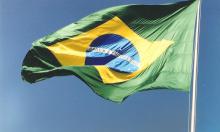Estonia commits legal sacrilege dismantling monuments to Soviet warriors
Estonian Parliament passed February 15 the final version of the law regarding the dismantling of banned monuments. Estonian nationalists and right-wing activists applaud the decision: the law stipulates that the Bronze Soldier, the monument to the Soviet Warrior the Liberator standing in a small park near Tallinn’s Old Town, be removed within 30 days. News agencies have already reported on the attacks against the Bronze Soldier which had stood for more than fifty years over a communal grave of Soviet soldiers in the center of Tallinn. Now the Estonian authorities got the green light for toppling the monument. Moreover, Parliament also declared that September 22, the day when the Red Army liberated Tallinn from the German troops, was to be commemorated as a day of mourning.

The new legislation has yet to be signed into law by Estonian President Toomas Hendrik Ilves. The president is hesitant to make a final move. The President said that the law contradicts to the norms of the Estonian Constitution and should be sent for further development. However, it is not ruled out that the head of Estonia will eventually put his signature on the anti-Russian document.
Apparently, he would not like to be the leader of a nation that commits blasphemy against the soldiers who defeated Nazi Germany. In the meantime, members of Parliament do not seem to be worried by the delay. The point is that President Ilves signed another measure passed by the Parliament. Under the law, Estonian authorities are to remove the remains of soldiers if the former are buried in an “inappropriate place.” The Bronze Soldier and the remains of 13 Soviet soldiers buried beneath it were put on top of the official list of war monuments and tombs to be removed.
Looks like not only Russia but some other countries as well are sick and tired of witnessing numerous acts of blasphemy and vengeful hatred committed by Estonia against its neighbor on the East. Some time ago Estonian Prime Minister Abdrus Ansip slapped a ban on the erection of a monument to Peter the Great in the city of Narva. Though the above Russian emperor was not dubbed a “Soviet occupier,” he was characterized as a “historic figure responsible for killing and pillaging the Estonian people at a large scale.”
Responsible politicians in many countries have repeatedly warned Estonia: do not sow discord, do not touch the remains of those who defeated Nazi Germany, do not provoke Russia to take steps in response. Even President Waldus Adamcus of Lithuania, one of three Baltic States, made a special statement addressed to the Estonian government several days ago. “We should leave the Bronze Soldier as it is and keep moving forward. We should stop looking back, creating unnecessary problems,” said Adamcus.
The Estonian government seems to have ignored Adamcus’ appeal. The new legislation on the “banned constructions” is sure to create problems. The law in question stipulates that monuments which “cause enmity and may violate the public order” are to be dismantled. Ostensibly the law was passed with a view to stabilize the situation in society. Yet the Estonian lawmakers should have at least taken into consideration the fact that the Bronze Soldier is the “last line of defense” for hundreds of thousands of ethnic Russians (and only Russians) living in Estonia. It is something akin to Stalingrad for them. The people are ready to stand up to bulldozers or triumphant neo-Nazis. The possible repercussions of the implementation of the new law may be disastrous.
Russia should, without doubt, respond strongly and adequately to the meanness of the Estonian government. Russia could take a variety of steps yet any of them should ensure that the Bronze Soldier remain intact. It is a matter of principles.
It would be pointless to lash out at Estonia again and threaten it with severe sanctions. The proposal for the removal of the monument to Russia is no good either.
The monument is one of the noticeable symbols of our vivid past, the symbol of our Great Victory. The modern history rests on these symbols. Let us rephrase the last bit: the modern history is being made with these symbols in hearts and minds. The younger generations in those countries would have probably had a completely different picture of WWII if not for the Bronze Soldier and similar war monuments scattered across other European countries. The young people might as well be under the impression that the main intrigue of World War II boiled down to the “courageous struggle of theGermans against the Bolshevists. The Germans were somewhat crazy yet highly organized and civilized people who made a heroic effort trying to resist the Bolshevist hordes, which were bound to bring death and chaos to Europe.”
Mikhail Leontyev, a commentator with the First Channel of Russian TV: “We need to take steps so that Estonia’s Western allies may put pressure on the Estonian government.”
“I’m quite amazed at a virtual lack of action on the part of the Russian government under the circumstances. At best, all the verbal attacks launched by Russian Parliament sound totally useless. At worst, the criticisms may produce the opposite effect. I specifically refer to the proposal calling for the transfer of the remains of the Soviet soldiers to Russia.
It would be a disgrace at a world scale for Russia should they succeed in dismantling the Bronze Soldier. The disgrace would serve us right because we would be the ones to blame for such an outcome. We would be the ones who let it happen.
We should focus our efforts on Estonia’s allies and protectors at the West. It’s the only way of putting pressure on Estonia, as far as I’m concerned. We should hold talks with a number of states, which can’t and won’t allow legalizing Nazism in Europe. It’s about time Russia started talking to NATO and the EU, into which Estonia is now incorporated. We should also discuss the problem with the U.S, Germany and Scandinavian countries. We have to put it into the spotlight for the whole world to see. That’s the tactic which may help us do things our way.”
Russian members of Estonian Parliament had no guts to object to the nationalists
The term “Estonian Parliament” sounds pretty faceless. After all, who are those people who pushed for the monument’s removal?
It is understood that the former Estonian prime minister Mart Laar, an author of scandalous history books, voted the bill into law. But Mikhail Lotman, a son of the renowned philologist Yuri Lotman, voted for the bill too. Well, it stands to reason since Mikhail Lotman reportedly sold his father’s archives along with all the books of a library for $80,000 two years ago. Incidentally, Yuri Lotman served as a gunner in the Soviet Army during the WWII. The media reported that Mikhail had literally cleared out the contents of his father’s study. He sold everything including diplomas and personal correspondence. He even took away an old draft board card of his father…
We should speak a little bit more about the role of the Russian members of Estonian Parliament for the enactment of the legislation. No wonder Trivimi Velliste was one the deputies who had supported the new law. Velliste has always been known for his extremely radical views. However, everyone in Estonia is aware of the deputy’s true name, which is Trofim Velichkin. The deputy strongly denies all allegations as to his real name (in fact, he prefers to use English while speaking with Russians – ed. note). In theory, the fate of the legislation depended on the stand of several members of Estonian Parliament, the ethnic Russians bearing Russian names. The results of the vote speak volumes. Deputy Nelli Kalikova voted for the legislation;
Deputy Tatyana Muravyeva was reportedly present in Parliament during the vote but never pressed the button to register her vote. Deputy Sergei Ivanov was missing during the vote. Rumor has it that Ivanov had gone to a cafeteria shortly before the vote took place. Forty four Estonian members of Parliament made an attempt to save Estonia’s reputation. But they were two (sic) votes short to block the decision.
President will not sign the law
Estonian President Toomas Hendric Ilves made a statement February 15 to advise that he would not sign the new law passed by Parliament. The president said that the law contradicted Estonia’s constitution. No further details regarding the president’s decision were available.
Now the Estonian president is supposed to send the bill back to Parliament. Only weeks before elections scheduled for March 4, it is most likely that new members of Estonian Parliament will deal with the bill. However, there is no guarantee whatsoever that new members of Parliament will give up their plans for the removal of the monument to the Warrior the Liberator. The legislation will be referred to court should the president reject it twice.
Komsomolskaya Pravda
Translated by Guerman Grachev
Pravda.ru
Free your mind on Pravda.ru forum
Subscribe to Pravda.Ru Telegram channel, Facebook, RSS!




